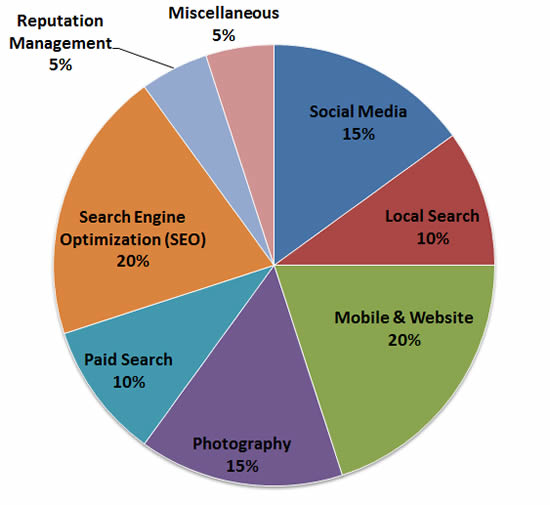This post has been updated. Read the most recent version here: How to Budget for Hotel Digital Marketing in 2024.

Number crunching, headaches, owner approval, Brand approval, and furious calculations… It sounds like budgeting season is here! We know how tedious it is to go through last year’s budget to determine where you can cut costs or where more money should be spent. Not to mention, it’s difficult to keep up with the ever-evolving online market, let alone to know how much money to set aside for new initiatives that may arise. That’s why Blue Magnet has put together this list of online marketing budget advice for hotels that will help you plan for a lucrative 2013.
Although it can be an exhausting process, we know that once a hotel has a set budget, it becomes nearly impossible to reallocate these funds. Budgeting season is our opportunity to ensure hotels know how to allocate the appropriate funds for internet marketing costs in order to see the ROI they expect.
Planning for Hotel Budget Season
The first step in budgeting effectively is to understand upcoming trends and opportunities in general, both for your market and for hotels. In 2013, social, local and mobile (SoLoMo) will continue its steady rise, while investment in traditional media will continue to dive. Google reports that 50% of travelers reserve hotel stays online, so doesn’t it make sense to allocate at least 50% of your overall marketing budget to digital marketing? Even though SoLoMo will take precedence, Blue Magnet Interactive recommends guaranteeing your entire online presence is up to par by allocating funds to all of the online marketing strategies below in order to see the best ROI on your campaign. Without further ado, here are Blue Magnet Interactive’s recommendations for how to spend your online marketing budget in 2013, staring with SoLoMo.
Social Media (The “So”)
While it’s certainly possible that Facebook may someday go the way of MySpace, social media as a movement is here to stay. Reputation management and engaging via social channels will continue to be a crucial piece of your online marketing campaign.
Engaging in social media can even help your organic search rankings. As engagement increases in your social media campaigns, research suggests that you may gain higher search engine rankings in correlation to your social media usage. Bing, for example, now has a very prominent social search bar on the right side of your screen, encouraging people to see what search listings their friends like and recommend. Google, too, is starting to boost rankings to hotels that have been +1ed by your inner circle. Hotels with little or no social media presence will start to slowly drop in rankings, unless they decide to jump on the social media train and engage.
In order to increase your engagement and your number of followers on social channels, hotels should create a social media marketing plan that strategically incorporates paid ads as well. Facebook Ads are very inexpensive, simple, and they are a great way to target people with interest in your hotel or property.
Blue Magnet social media budget recommendation: ~15%
Local Search (The “Lo”)
Why is local search important? Consider how you search. Typically, when searching for a hotel or restaurant you have a rough idea of the area you’re searching. For example, say you are heading to Nashville on business and you need to find a hotel. You’ll probably type something like “hotel in Nashville” into your favorite search engine. Or, if you’ve just landed in Nashville you will probably do a search on Google Maps or Yelp on your smartphone for hotels nearby. Both of these are considered local searches.
In order to make sure you are showing up in these local searches you need to optimize your presence for local searches as well as organic searches. There are very specific ongoing strategies for increasing your visibility through local search. Blue Magnet Interactive has seen success by utilizing Whitespark’s Local Search Citation finder to ensure we are covering all of our bases with local search. Please keep in mind that this, too, is a strategy that is ever-evolving and needs consistent attention throughout 2013 and beyond. Blue Magnet Interactive recommends having an SEO expert handle all of your search marketing.
Blue Magnet local search budget recommendation: ~10%
Hotel Website & Mobile Site (The “Mo”)
Your online budgeting goals should all boil down to one objective: Drive direct online reservations through your hotel website (brand website, standalone website or both!). In addition, with the increase in the number of searches though mobile channels in 2013 it will be essential to encourage mobile bookings by creating a mobile friendly website.
Take a look at your competitor’s websites. Now look at their mobile sites. Go back and objectively look at your own brand and mobile sites. If your site is over 3-5 years old, there’s a great chance that your competitors are stealing your bookings just by having a more aesthetically pleasing site, even if your product is better. If your website is cluttered, poorly designed, difficult to navigate, lacking compelling imagery, or outdated, it may be time for a complete redesign. It’s often a potential guest’s first impression of your hotel — better make it a good one!
Hotel websites with the highest conversion rates are based heavily on hotel photography and they are easy to navigate. If you’re building a site from scratch, it will be extremely important to consult an SEO team to ensure your site is built to be search engine friendly. SEO has changed drastically in the last 3-5 years, so if your site is older, there’s a good chance your hotel websites structure and content are hurting your rankings just by its outdated construction.
In addition, mobile site usage is quickly increasing. Experts predict mobile hotel bookings will surpass desktop bookings very soon, if they haven’t already by the time you found this article. Mobile sites can be simple and inexpensive, plus they tend to convert well and produce an excellent ROI. What’s more, new technology, such as Responsive Web Design, allows you to create a website that is both mobile optimized as well as desktop and tablet optimized. Responsive web design can be an extremely affordable solution for your hotel, as it essentially allows your site to dynamically adapt to the screen size of any viewing device, whether it’s a smartphone, desktop computer or tablet.
Blue Magnet website and mobile site budget recommendation: ~20%
Budgeting Beyond SoLoMo
New Photography
The same rule applies to new photography as it does to your hotel website’s lifespan: If your hotel photos are more than 3-5 years old, now is the time to budget for a new photo shoot. Likewise, if your hotel has been renovated since your last photo shoot and your website does not reflect your new photos, you’re missing out on a huge opportunity to showcase your newly renovated accommodations. While costly, photos are crucial to selling your site, particularly online. Moreover, photo gallery pages tend to be one of the most viewed pages or your site. Photos turn lookers into bookers. Our analytics show that beyond the homepage, the Photo Gallery consistently receives the most visits on hotel websites.
Blue Magnet Interactive recently recommended a photo shoot to one of our clients with outdated photography. After one month of having the photos live, their conversion rate increased 5% YOY to an almost 12% conversion rate! If you’re driving traffic to your site but the conversion rate is consistently low, updating your photos may be the key to securing more bookings.
Blue Magnet photography budget recommendation: ~15%
Paid Search
In 2013, hotel should continue to allocate a fair chunk of the budget towards paid search in Google and OTA sites. Paid ads are still one of the quickest ways to gain exposure for targeted keywords and one of the most measurable sources of online ROI.
Google’s PPC program is one of most commonly used methods of paid advertising and it works well for many different advertisers. Specifically in the hospitality industry, we have seen the most success with Expedia Travel Ads, Intent Media Sponsored Ads (Orbitz & Travelocity), and Facebook Ads. These programs tend to be very successful because they are so customizable and give hotels the ability to target specific need dates.
Blue Magnet paid search budget recommendation: ~10%
Search Engine Optimization (SEO)
In the past, we’ve heard clients say “Our site is already SEOed, we don’t need ongoing management.” Just because your site was initially built to be SEO-friendly with keyword optimized content and meta tags, that does not mean your rankings will withstand the test of time. In 2011, Google changed their algorithm over 500 times. As a result, Google’s search results are becoming more relevant and valuable. If your hotel isn’t keeping up with website updates and adjusting the SEO strategy accordingly, your hotel – that previously ranked on the first page of Google’s search engine ranking position (SERP) – could drop drastically in a matter of weeks or months. Allocating funds monthly to an SEO specialist is absolutely essential for maintaining and gaining exposure in various search engines.
Blue Magnet SEO budget recommendation: ~20%
Reputation Management
Funding reputation management is always a budget must-have. No matter how well your website looks and functions, your guests will have positive and negative reviews on various internet channels. According to RateTiger, 33% of bookers change their choice of hotel based on reviews alone. Unattended negative reviews can be the difference between a guest choosing your hotel or choosing your competitor’s product. However, simply having someone manage your reputation and respond to any review in a helpful, concerned manner will be dramatically beneficial to you reputation. Consider SoLoMo again; Google+ Local now shows Zagat reviews on their listings, clearly displayed for users once they click on your listing. A reputation manager can manage all review sites, respond to these reviews, report fraudulent reviews entries, and even perform other tasks that will encourage new, more positive reviews to push any negative reviews further down on the list and thus out of sight. Dedicating some of your budget to reputation management is a definite must for 2013.
Blue Magnet reputation management budget recommendation: ~5%
Maintenance and Miscellaneous
It’s a well-known fact that the internet is constantly evolving at a rapid pace, which means your newly-constructed website or your perfectly-tweaked social media profiles can’t just be left by the wayside. Someone needs to constantly update your website’s content for freshness and usability. Your social media profiles should be updated regularly with valuable content that engages your community and encourages online conversations. As you can imagine, maintaining a website’s freshness and posting regularly on social media requires time, dedication, and knowledge. What’s more, as the internet evolves, there may be new initiatives that arise throughout the year that will require additional budget. For example, in 2011 Google launched their social media platform, Google+, and just recently, they combined Google+ with their Local Search listings to create a one-stop shop for online users. This affected the hospitality industry since hotels must now have a Google+ Brand profile in order to optimize their Local Listing. New initiatives (i.e. the introduction of Apple Maps) that require time and knowledge will continue to crop up as the year continues and as the internet continues to grow. Be sure to allot enough money in your budget to handle these maintenance and miscellaneous expenses.
Blue Magnet miscellaneous budget recommendation: ~5%
2013 Online Marketing Budget Breakdown
Tying It All Together
While headaches, number crunching, approvals and many scratch-outs may still be a part of your 2013 budget meeting, planning ahead for your online marketing budget will save you the hassle of reallocating funds. These tips should provide you with clear insight as to what is important to budget for 2013, so that you don’t get caught empty-handed when that new travel website launches or when Google releases a new update.
*This article was co-authored by Jennifer Dewey and Ashley Stevens.







